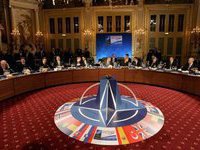Russia suddenly becomes NATO's only hope
While the Russians were revolting against the "NATO bases" in Ulyanovsk, the authorities have made a decisive step. After quarreling with everyone who helped them, for the Americans Russia has become the only way to save the United States money on the transit of cargo to Afghanistan. Moscow, however, made some clever calculations and got a hefty amount of money from the Americans.
Even before the presidential elections the opposition speculated on the topic of a possible NATO bases on the territory of Russia in case of the victory of Vladimir Putin, assuring the public that the new leader of the country will simply hand it over to the aggressive Americans. And indeed, after the signing of an agreement on multimodal freight route from Afghanistan, a storm of indignation broke off in the Russian society. But what will this "deal with a conscience" brings to Russia and is it as bad as it said to be?

It depends on the angle. On the one hand, never before has America been so weak and vulnerable to global challenges, as it bit every hand that was feeding it. On the other hand, for the United States the strengthening of its influence in the troubled regions is of paramount importance, no matter who is in power, and what economic policy the country has in relation to partners and opponents. Earlier, in the times of "past glory", provision of troops to the forces of international security in Afghanistan followed two routes: through Pakistan to the United States and Europe, as well as the territories of Uzbekistan, Kazakhstan, Georgia and Turkey. The Manas base in Kyrgyzstan has served as a logistics center.
However, then, under pressure from the Islamic world and China, the transit route through Pakistan was blocked, the Kirghiz declined to further lease the Manas base, and in 2008 the financial crisis broke out. Even the first economy in the world had to tighten its belt and look for cheaper and, most importantly, safer way of transferring cargoes of the North Atlantic Alliance, as the Pakistanis and Uzbeks with enviable regularity robbed the U.S. military. Turkey proved to be too far away to go without refueling, and America's devoted vassal, Georgia, simply could not provide large U.S. engineering a warm welcome, despite the strong desire of Saakashvili to do a favor to the U.S. State Department.
The situation is exacerbated by the fact that NATO member states in Europe are busy shrinking budgets; therefore, for them the conversion of the Alliance into a special tool is currently more cost-effective than the sovereign model of Defense. Only now the U.S. will have to pay for it if it wants to continue to be known as the financial engine of the military unit.
For example, for Germany participation of one military in the operations of the Alliance costs 5.16 million euros - three times more than the average across the EU. It is not surprising that Germany is increasingly refusing to participate in military interventions for the needs of the U.S. Consequently, the German Finance Ministry plans by 2014 to reduce defense spending to 24 billion euros. Today the amount is 31 billion, representing 1.3 percent of GDP.
That was when Russia has come up. The assumption was that Russia can provide an airport, and even military transport aircraft for the needs of the Alliance forces, but certainly not without a reward. The price of the deal was estimated at 2.5 billion dollars, or six thousand dollars for each cargo carried - for the entire period of the withdrawal of troops from Afghanistan. But the Americans, in essence, were not left any choice - the Russian monopoly networks were quite professional. No one has ever been paid that kind of money by Washington, none of the countries participating in the block, which says a lot.
Of course, the picture is not as perfect as it may seem at first glance. For Moscow the withdrawal of NATO troops from Afghanistan is not beneficial because Russian border guards would have to deal with the Taliban. The forces of CSTO will not agree on joint action against the Afghan factions any time soon. As for forecasts, time will tell whether participation of Russia in transit of cargoes from Afghanistan will bring Russia more pros than cons. In the meantime, one can enjoy watching Russia making business out of thin air.
Darya Deryabina
Bigness
Subscribe to Pravda.Ru Telegram channel, Facebook, RSS!

